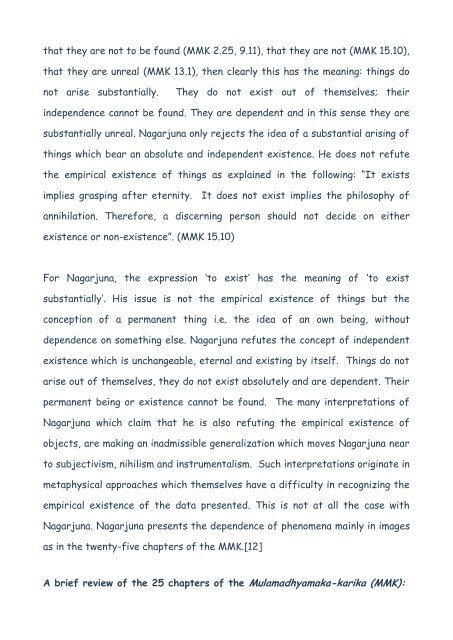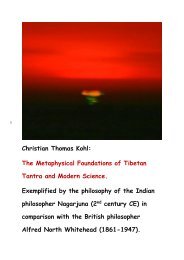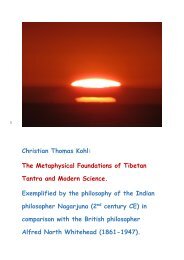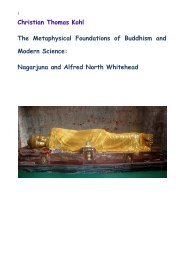The Metaphysical Foundation of Buddhism and Modern Science
The Metaphysical Foundations of Buddhism and Modern Science: Nagarjuna and Alfred North Whitehead
The Metaphysical Foundations of Buddhism and Modern Science: Nagarjuna and Alfred North Whitehead
Create successful ePaper yourself
Turn your PDF publications into a flip-book with our unique Google optimized e-Paper software.
that they are not to be found (MMK 2.25, 9.11), that they are not (MMK 15.10),<br />
that they are unreal (MMK 13.1), then clearly this has the meaning: things do<br />
not arise substantially.<br />
<strong>The</strong>y do not exist out <strong>of</strong> themselves; their<br />
independence cannot be found. <strong>The</strong>y are dependent <strong>and</strong> in this sense they are<br />
substantially unreal. Nagarjuna only rejects the idea <strong>of</strong> a substantial arising <strong>of</strong><br />
things which bear an absolute <strong>and</strong> independent existence. He does not refute<br />
the empirical existence <strong>of</strong> things as explained in the following: “It exists<br />
implies grasping after eternity. It does not exist implies the philosophy <strong>of</strong><br />
annihilation. <strong>The</strong>refore, a discerning person should not decide on either<br />
existence or non-existence”. (MMK 15.10)<br />
For Nagarjuna, the expression ‘to exist’ has the meaning <strong>of</strong> ‘to exist<br />
substantially’. His issue is not the empirical existence <strong>of</strong> things but the<br />
conception <strong>of</strong> a permanent thing i.e. the idea <strong>of</strong> an own being, without<br />
dependence on something else. Nagarjuna refutes the concept <strong>of</strong> independent<br />
existence which is unchangeable, eternal <strong>and</strong> existing by itself. Things do not<br />
arise out <strong>of</strong> themselves, they do not exist absolutely <strong>and</strong> are dependent. <strong>The</strong>ir<br />
permanent being or existence cannot be found. <strong>The</strong> many interpretations <strong>of</strong><br />
Nagarjuna which claim that he is also refuting the empirical existence <strong>of</strong><br />
objects, are making an inadmissible generalization which moves Nagarjuna near<br />
to subjectivism, nihilism <strong>and</strong> instrumentalism. Such interpretations originate in<br />
metaphysical approaches which themselves have a difficulty in recognizing the<br />
empirical existence <strong>of</strong> the data presented. This is not at all the case with<br />
Nagarjuna. Nagarjuna presents the dependence <strong>of</strong> phenomena mainly in images<br />
as in the twenty-five chapters <strong>of</strong> the MMK.[12]<br />
A brief review <strong>of</strong> the 25 chapters <strong>of</strong> the Mulamadhyamaka-karika (MMK):


















